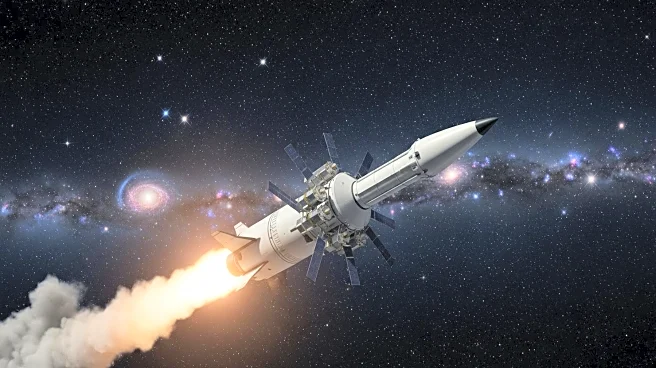What is the story about?
What's Happening?
SpaceX successfully launched its Falcon 9 rocket from Cape Canaveral Space Force Station, carrying 24 of Amazon's Project Kuiper broadband internet satellites. The launch, initially delayed due to poor weather conditions, took place at 9:58 p.m. EDT. The mission, named Kuiper Falcon 03, faced several days of postponement due to unfavorable weather both at the launch site and offshore. The Falcon 9 first stage booster B1091, which had previously supported the KF-02 mission, was used for this launch and performed an autonomous landing on the drone ship 'A Shortfall of Gravitas'. This marked the 128th landing on this vessel and the 517th booster landing overall. The deployment sequence of the Kuiper satellites began 56 minutes after liftoff, adding to the constellation's total of 153 satellites in low Earth orbit.
Why It's Important?
The successful deployment of Amazon's Kuiper satellites is a significant step in expanding global broadband internet access. Project Kuiper aims to provide high-speed internet to underserved regions, potentially transforming connectivity for remote and rural areas. This launch also underscores SpaceX's growing role in satellite deployment, enhancing its reputation as a reliable partner for commercial satellite operations. The expansion of the Kuiper constellation could intensify competition in the satellite internet market, challenging existing players like SpaceX's Starlink and OneWeb. The increased satellite presence in low Earth orbit may also raise concerns about space debris and the need for effective space traffic management.
What's Next?
With the Kuiper constellation now expanded, Amazon is likely to continue its efforts to deploy additional satellites to achieve its goal of providing global internet coverage. Future launches will be crucial in building out the network and ensuring its operational capabilities. SpaceX's continued involvement in these missions may lead to further collaborations with Amazon and other companies seeking satellite deployment services. Additionally, regulatory bodies may need to address the growing number of satellites in orbit to prevent potential collisions and manage space debris effectively.
Beyond the Headlines
The launch highlights the increasing commercialization of space and the role of private companies in advancing technological infrastructure. As satellite constellations grow, there may be ethical considerations regarding the impact on astronomical observations and the night sky. The collaboration between SpaceX and Amazon also reflects broader trends in the tech industry, where partnerships are formed to leverage each other's strengths in achieving ambitious goals.

















